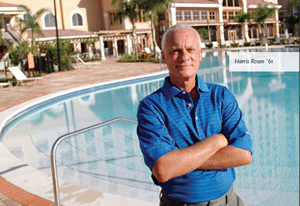Hope’s Rewards
The heart of Tangelo Park lies about two miles from Orlando’s International Drive, a meandering and intensely developed 14.5 miles of theme parks (six), hotels (over 100), outlet malls, souvenir shops, restaurants, and smallscale family attractions. Tangelo Park is not a park at all, but a nearly squaremile, neatly rectilinear concentration of tract houses built in the 1950s to house employees of the nearby Martin Marietta plant and McCoy Air Force Base. More than 50 years later, some are boarded up by foreclosure, but most are occupied by about 750 households, 90 percent of them African- American. Eighty-six percent of the community’s young schoolchildren qualify for free or reduced-cost lunch services, according to the principal of Tangelo Park Elementary School, Tashanda Brown-Cannon.

Callers to the elementary school are greeted by an infectiously upbeat recorded welcome describing it as a place “where we just can’t hide our Tiger pride!” Not a trace of irony can be applied to this claim. For four consecutive years, said Brown-Cannon, the Florida Department of Education has rated Tangelo Park Elementary School as a high-performing school, and this past year the school received its fourth A grade since 2005-06. The education department named Brown- Cannon the state’s literacy leader in 2008-09 and ranked Tangelo Park fourth among Florida elementary schools for gains in reading, writing, math, and science in 2007-08. Contributing to the gains seen at the elementary school, Tangelo Park’s preschoolers placed first in Orange County for school readiness in 2004.
Back over on International Drive you will find Harris Rosen ’61, the man who engineered these successes. The owner of seven area hotels with more than 6,300 guest rooms, Rosen is the Orlando area’s leading independent hotelier. Several of those hotels are strung along International Drive, including his ultimate luxury property, the 1,500- room Rosen Shingle Creek.
Fifteen years ago, impressed by the Tangelo Park community’s grassroots efforts to chase the drug dealers out of the neighborhood and create a supportive community network, Rosen decided to put the wind at their backs. He offered free daycare to every two-, three-, and four-year-old, and he paid for the teacher-training and facilities upgrades needed to turn nine homes in Tangelo Park into licensed preschools. (“Many of the kids are coming from these childcare homes reading in pre-K,” noted Robert Allen, the retired longtime principal of the elementary school.) Rosen funded parenting classes and job training for parents with children in school. He promised an all-expensespaid, in-state college or vocational education to every high school graduate who got accepted to school. He formed an advisory board with Allen as chair and involvement from the school, the YMCA, the Baptist church, and the Tangelo Park Civic Association. As board treasurer, he still attends their monthly meetings.
To date, Rosen has invested $7.9 million in the Tangelo Park Program. When residents ask him how long he’ll keep it up, he says, “When you guys are a gated community and the average home is selling for a million dollars, I’m outta here.” Until then, his estate will continue to fund the initiative in perpetuity.
Rosen had not done much in terms of philanthropy before adopting the community of Tangelo Park. “I was in my fifties when I was persuaded that the timing was right,” he said. “I wanted to be sure that it was appropriate for me to start giving these funds away, that if things really became horrible I wouldn’t regret it and put in jeopardy the 4,000 people who work for me. At least that was how I rationalized not giving.”

The grandson of East European immigrants who lost everything in the Great Depression, Rosen grew up in the shadow of the Manhattan Bridge. He stepped over drunks on the way to school and saw the legions of homeless people who took shelter under the el. He and his young playmates called timeout to watch people jump from the bridge. They hitched rides on the backs of buses and opened fire hydrants to cool off in the summer. But his parents raised his sights. “My parents convinced me that there was another world out there and that, if I wanted to enjoy that world, it was up to me,” he said.
As an artistically talented graduate of New York’s public School of Music and Art, Rosen got accepted to a slate of prominent fine-arts schools. Doubting his ability to make a living as an artist, though, he also applied to Cornell’s School of Hotel Administration. He had been exposed to the hotel business by his father, a safety engineer at the Waldorf Astoria, who introduced him to hotel guests including Marilyn Monroe, Douglas MacArthur, Jackie Robinson, Ty Cobb, and Pope John XXIII. “In the back of my mind there was a thought that this was a pretty cool business, so I applied to Cornell.”
After graduation, a three-year stint as an officer in the Army, and tenures in sales at the Waldorf Astoria and in management for Hilton, Rosen went to work for Disney in Orlando as director of hotel planning. His departure, less than three years later, was involuntary; his boss’s boss delivered the news. “He started off by saying, ‘It is clear to us that you will never become a Disney person.’ I was somewhat taken aback,” he related with mock astonishment. “I asked him, ‘Is it because my ears are too small?’” That was, the big boss told him, exactly what he meant.
It was now 1974, the year of the Arab oil embargo, and road travel in America was drying up along with the gas pumps. Rosen was 34 years old. He had $20,000 in his bank account, enough to acquire a failing motel on International Drive, the 256-room Quality Inn Plaza. After a week of watching cars not pull in, and with his last $25 in his pocket, Rosen stuck out his thumb and hitchhiked to New England to track down the motorcoach operators who made tourist runs to Orlando.
In five days he signed up about a dozen of them, enough to get him through the first year. “I would ask them what room rate they wanted to stay with us. They would say $8 or $9 or $7; I would write the rate down, with the name of the company, on my business card or a cocktail napkin, sign my name, and that was the contract. Many of those New England motorcoach operators remain today as our clients. Of course, they have expanded tremendously. From one or two buses to Orlando, some of them are now up to 20 or 30 buses to Orlando.”
Rosen lived frugally for years in the motel, saving payroll expenses by being his own gardener, food and beverage manager, sales manager, security chief, buffet carver, night runner, and youname- it, and renovated the rooms oneby- one as he could afford to. He never borrowed money, a policy that continues to serve him well. “Those of us who are debt-free have a decided advantage in the marketplace. We break even at occupancies and average rates much lower than the stereotypical property. Rate never bothered me a great deal. What does bother me is not being able to keep people working.”

Last spring, while others in the industry were looking for ways to streamline their operations or simply to survive, Rosen launched what he cheerfully called “the Rosen Stimulus Plan,” a $30 million refurbishment of his leisure properties on International Drive. When that’s done, he said, “We’ll go back to Rosen Centre and Rosen Plaza and add some meeting space and refurbish them as well. Then we’re going to build a state-of-the-art central laundry. There are so many wonderful things yet to accomplish.” Rosen has done a lot of other wonderful things, too. He donated 20 acres of land and the funds to build the Rosen College of Hospitality Management and an adjacent complex of student apartments at the University of Central Florida, and he gave the university $2.5 million to establish a scholarship endowment. He was the principal donor for a recently opened Jewish community center that is named for his parents, Jack and Lee Rosen. He fought tenaciously to save an aquatic center from demolition and donated it to the YMCA. “During the past 20 years we have drown-proofed about 20,000 kids, all on scholarship,” he said proudly. His employees have also benefited from his purposeful approach to generosity. He offers them profit-sharing, pays their way through college, and gives them leave time to volunteer in Tangelo Park and elsewhere.
Most radical is his answer to healthcare benefits. After losing patience with his insurance carrier and “the traditional healthcare paradigm” 18 years ago, he decided to convert an unused accounting office into an onsite primary-care center. The center has two full-time physicians, two nurse practitioners, and a staff of 28. He contracts with specialty surgicenters and birthing centers in the area, saving money while ensuring better medical outcomes for his employees.
“Healthcare cost our little company $15 million last year,” he said. “Preventative care—wellness—is something we are passionate about. We want to encourage people to stay healthy. If someone is admitted to the hospital, they pay the first $500 and I pay the rest; we can do it because we’re self-insured.”
As a CEO, Rosen believes in accessibility. “We don’t have and never have had an organizational chart. Organizational charts are rigid, and we don’t like rigidity. We like free-flowing ideas. Anyone can talk to anyone.” Indeed, Rosen said he meets alone with his hourly associates every two weeks. “My first question is, ‘Are we treating you with respect? Do you feel comfortable working in our company? If you have a problem or question, do you feel comfortable discussing it with your supervisor, your manager, or the general manager?’”
His management philosophy has paid off. “Many of our associates have been with us for 20 years or more,” he said. “Turnover in our company is, I suspect, the lowest in the hospitality industry, by far. We turn over single digits in a year, and our industry, I’m embarrassed to say, turns over anywhere from 50 percent on the very low end to 250 percent on the high end.”
Rosen has also seen an impressive return on his investment in Tangelo Park. Before he got involved, he said, “Tangelo Park was experiencing some very, very rough times. It was the highest-crime neighborhood in central Florida, and perhaps in the state. Prostitution and drugs were abundant, and the rate of graduation from high school was in the 30 percent range.” Now, he says, the graduation rate is nearly 100 percent, and 370 students have taken him up on his offer of a free education and claimed scholarships. To date, 55 of them have earned bachelor’s degrees, but the real proof of Rosen’s impact is still to come, since the first wave of children to benefit fully from Rosen-sponsored preschool and his involvement in the elementary school and the community are only now college-age.
Desiring an objective measurement of the success of the Tangelo Park Program, Rosen asked Lance Lochner, now an associate professor of economics and Canadian Research Chair in Human Capital and Productivity atthe University of Western Ontario, to crunch some numbers. Among other things, Lochner analyzed graduation rates and crime rates between 1993, when the program started, and 2003, the last year for which data were available when the study was done. Among his findings:
• As graduation rates for all non-white students in Florida public schools increased by less than one percent, the graduation rate among students from Tangelo Park increased 17 percent. Most of this gain was seen early on and was therefore due entirely to the promise of a college education.
• College attendance went up 31 percent among Tangelo Park students while declining five percent among the statewide comparison group.
• In Tangelo Park, car theft declined by 25.6 percent, burglaries by 45.5 percent, and assaults by 20.5 percent. In the surrounding sector of Orange County, auto thefts went up 20.3 percent, burglaries went down only 10.3 percent, and assaults declined .3 percent.
Rosen also notes that housing prices in Tangelo Park have risen (or had, until last year’s downturn) from about $40,000 to as much as $160,000; many residents have added on or made other improvements to their homes, according to Jeroline Adkinson, a community leader. (Fewer homeowners have children in school, however; they have aged in place, and the parents of current students tend to be renters, many of whom have moved into the neighborhood to take advantage of the Tangelo Park Program. An increasing number are homeless.)
The most striking statistic is the one Rosen repeats as often as he can: for every dollar he spends on Tangelo Park, society reaps seven. “I needed to know that,” he said, “and now that we know that, we can start to have conversations with people who may be inclined to replicate the program.” This summer he received an email message of support from Colin Powell. In August he got to state his case to Secretary of Education Arne Duncan during the secretary’s visit to Orlando. In October Duncan’s office sent word that he is sending a staffer to visit Tangelo Park and report back to the secretary on his findings.
“We don’t want any money from the public sector,” he said. “All we want is for them to recognize this program as a viable alternative to doing nothing. If we spend, say, $10 million in 15 years, then society is the recipient of $70 million in return. If we do it nationwide and we spend $1 billion, we get back $7 billion. That’s an investment opportunity that doesn’t come along very often.”
Brown-Cannon, the elementary school principal, doesn’t need convincing. “It would be very beneficial if every school in every community had a Harris Rosen, someone who would be willing to support students, not only emotionally, but also financially. We have a lot of people who are in positions to support schools, and they send encouraging messages, but rarely do they send the financial support that’s needed.”
Rosen takes care of a number of needs at the school, according to Brown- Cannon and former principal Allen. Rosen worked with LensCrafters to get eyeglasses for 25 needy students last year. He reinstalled security fencing around the school. He provided a registered nurse. He bought a portable classroom to house the parenting program and the preschool supervisor, whose salary he pays. He pays for field trips and feeds the kids breakfast before they take their state achievement tests.
“But I would say that the most important thing he provides is a sense of hope,” said Brown-Cannon. “We’re finding that what children who come from poverty need most is a sense of hope that, if they attend school and work very hard, they will be able to have a college education.”
Rosen’s involvement has fueled high hopes for Tangelo Park Elementary School as well. “Our goal is to become a beacon of light in the field of education,” said Brown-Cannon. “We don’t want just district or state recognition; we want national recognition for being a quality school educating students the way the brain learns best. So that’s where the school is headed.”
With Harris Rosen behind them, it will surely happen.
—Jeannie Griffith
